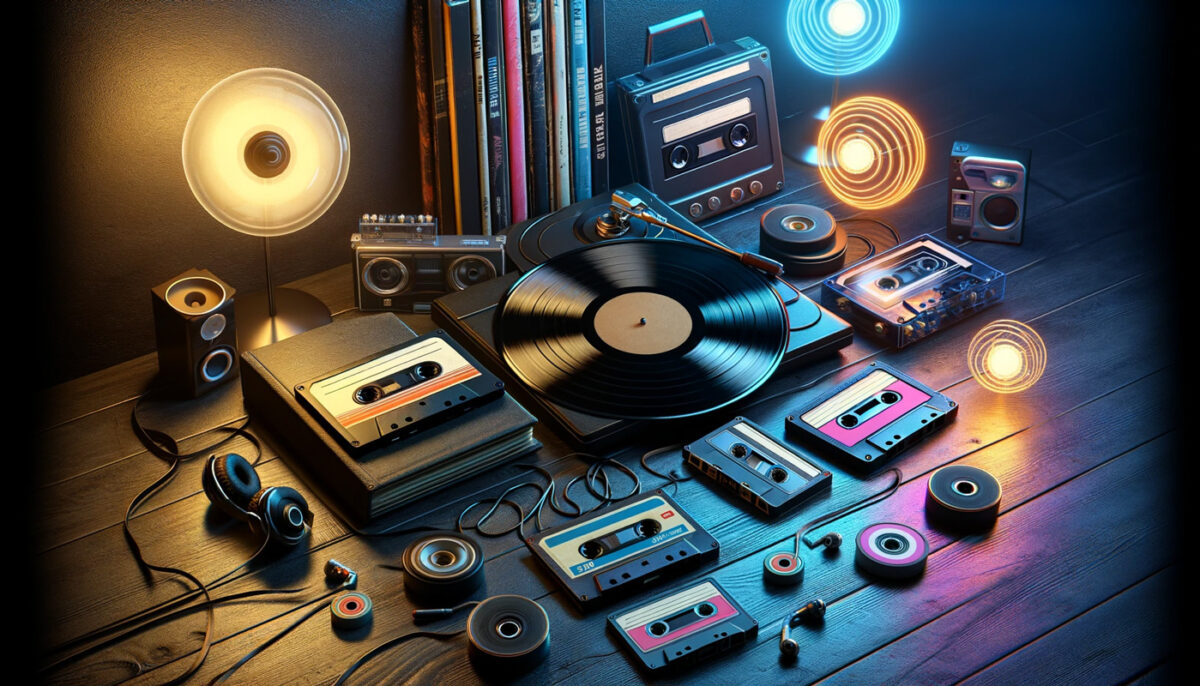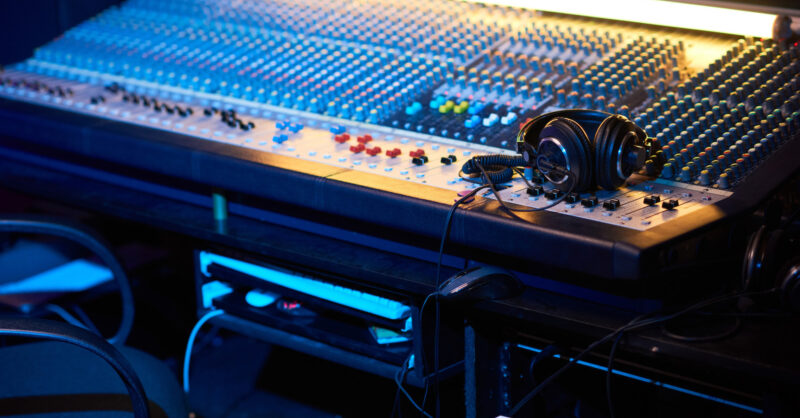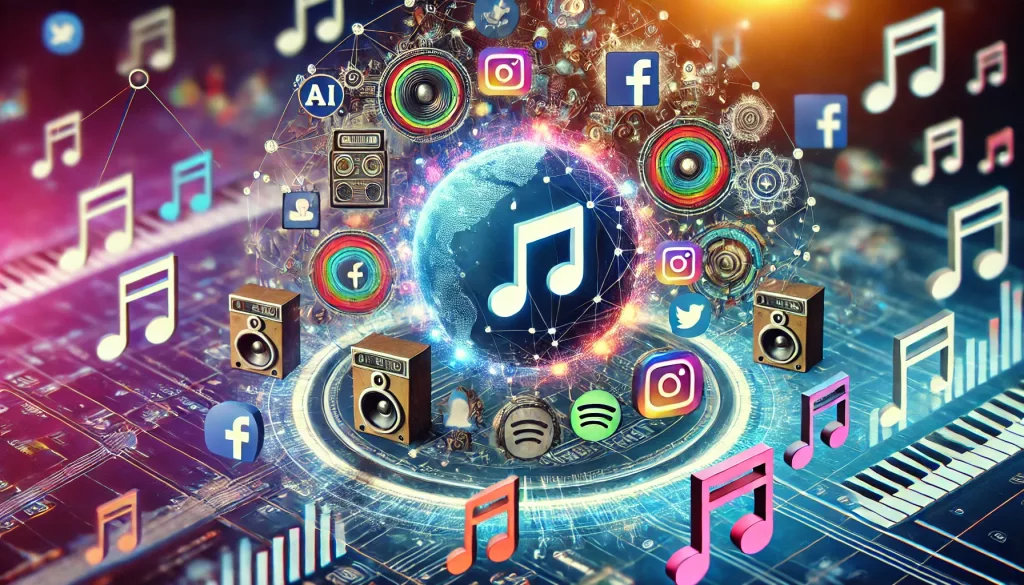What is more, the current music industry trends are still under the influence of technological changes and consumer preferences. Online platforms with digital streaming revenues, such as Spotify, Apple Music, and YouTube, have remained relevant, with machine learning providing unique listening experiences for listeners and also boosting subgenres. Pushing AI and machine learning to be implemented in music production, marketing, and playlisting, this study helps artists develop well-grown music.
Social media platforms like TikTok are changing how people listen to music; many songs get into the limelight through the different social media challenges prevalent. Also, interaction is taking place in a more personal way through live broadcasting and crowdfunding services.
One huge trend is the increase of independent artists, who utilize the tools and have access to both producing and promoting their music without the help of labels. On the other hand, vinyl and cassettes are back in the market, though they are targeting the individuals who love them.
What Are the Current Music Industry Trends?

Reducing an impact on the environment and accommodating musicians’ mental health needs are becoming important topics in the current music industry trends, as prominent members of this sector call out for substantial change. In this section, we explore the ways in which the global and technological developments that are dictating culture are affecting the music industry.
Read Also: Apple Music Replay: A Journey Through Your Listening Habits
We live in astonishing times for the music business. New advances, moving social propensities, and worldwide commotion imply that the music world is evolving quickly. The principles that have represented the business for quite a long time are dissolving, and peculiar and great new classes and configurations are emerging.
The creation devices are springing up out of control. 2025 makes certain to bring vulnerability—yet in addition a lot of chances. Here are our conjectures for what the eventual fate of music could hold. From striking new sorts to state-of-the-art creation devices, there are our nine music industry patterns to pay special attention to in 2025.
What Will Be the Next Big Thing in Music?
The following large thing in music is probably going to rise up out of a blend of new tech, changing audience propensities, and energizing new kinds. Artists in 2025 will presumably utilize generative simulated intelligence apparatuses to make music in extremely new ways.
Craftsmen will get through with novel styles that purge standard recipes—particularly on the off chance that they can consolidate them with web-based entertainment well-disposed designs. Furthermore, we're probably going to see the ascent of a filthy, credible style in popular music and then some. We'll go into these music patterns in more detail beneath.
What’s the Biggest Current Music Industry Trends in 2025?
The greatest classification of current music industry trends in 2025 presumably won't be a kind by any means. In the period of streaming and web-based entertainment, melodic classifications are separating and combining, transforming the music business into a bright mix of sounds and feel.
Read Also: How to Get into Listening to Dance EDM Music?
All things considered, audience members presently search out kind, bouncy styles and temperaments that will go with and uplift their day-to-day routines. Underneath, we'll go through some music industry patterns for 2025 that could replace a "major" classification: starting from the slowing of club music to the ascent of shoddy feel and the festival of idiosyncrasy in pop. Peruse on for our full rundown of expectations.
Top 5+ Current Music Industry Trends in 2025
1. Music Will Be Defined by Moment, Not Genre
We live during a time where conventional melodic classes are dissolving. Last year we expected the ascent of class smoothness and the personalization of music tuning in. True to form, music in 2024 has become ever more enthusiastically characterized, with streaming stages and web-based entertainment disturbing the obstructions among classifications and making customary delivery designs repetitive.
Artists shouldn't feel deterred by this. The downfall of stable classes doesn't imply that music is simply a futile backdrop. As a matter of fact, music is as yet a profoundly significant soundtrack to individuals' lives.

Streaming stages have seen a blast in client-made "POV" playlists, which catch and elevate exceptional minutes by offering the ideal soundtrack for a first kiss, a stormy day, or a ceaseless summer. In a new Spotify study, 80% of youngsters said that they feel like the primary person in a film while paying attention to music during their day-to-day exercises.
This exhibits that, as conventional classifications like sort and instrumentation become less significant, setting is turning into the main consideration for music tuning in. In 2025, performers will be boosted to consider their music not as far as what style it is, but rather the way in which it squeezes into an audience's life. What exceptional second could your next discharge be the soundtrack to?
2. Generative AI Might Enter Your Production Workflow
Simulated intelligence has been a natural idea in music creation for some time now. A significant number of us use items—like those from iZotope—that send brilliant innovation to help the creation interaction. In any case, we've yet to see a generally taken-on music creation device that completely bridles the tumultuous, state-of-the-art force of the new rush of generative man-made intelligence innovation (think ChatGPT for text, Stable Diffusion for pictures, etc.).
Related Post: What Is the Genre of Music That Screams?
These apparatuses don't simply help your dynamic interaction. They hurl entirely different thoughts in view of basic prompts, making them a flighty new accomplice in the inventive strategy. Up to this point, endeavors to apply this innovation to music have.
For the most part, appeared as administrations like Udio and Suno man-made intelligence that will make an entire melody from a text input. These devices could appear as though they are expected to supplant music producers instead of help them.
This isn't the main way that generative man-made intelligence could squeeze into the eventual fate of music. There are endless potential applications for the innovation that could advance, as opposed to supplant, the music creation process. Envision a module that produces a kick drum in light of a text brief or a multi-FX unit that rethinks sound in wild, erratic ways. Engineers are creating many such instruments.
However, they've yet to break into the music-production standard. 2025 may be the year that a generative man-made intelligence creation device is generally embraced by makers. This apparatus could present energizing new suggestions, sounds, or capacities that purge the universe of creation. Who knows, it could try and become key to your work process.
3. Dirty Aesthetics Will Take Over
2024 was the year that "non-mainstream scum" returned. This social pattern from the mid-2000s, celebrating hard celebrating and terrible fabulousness, was first restored in the style world. It later gatecrashed the music business through Charli XCX's mid-year ruling collection, Whelp.
Whelp's prosperity is even more amazing when you consider that its crude creation, unseemly club beats, and spur-of-the-moment vocals contradict large numbers of the guidelines of the advanced music industry. In the period of cell phones and online entertainment, performers are supposed to be amazing constantly. Each look ought to be cleaned and each melodic choice cautiously workshopped by groups of specialists.
Charli's prosperity—and related pop minutes, similar to Kesha's recovery of horrendous '00s Eurodance on "Drive" Around"—propose that individuals are prepared for something else. A great deal of late mainstream society has felt pretty stage-made due. Maybe fans are prepared for something all the more free, unconstrained, and fun.
4. Social Media Will Birth New Formats
In 2024, numerous makers will let you know that it's harder than at any other time to get their music before audience members. Physical and download deals are a specialty market now, and streaming stages are precarious to break. Regardless of whether one of your tracks ascends high in the playlists, likely arriving at aloof audience members, it probably won't look at your other music, not to mention become enduring fans.
Numerous music-sweethearts currently fundamentally draw in with music through web-based entertainment. Rather than looking at an entire tune on Spotify or getting it from your Bandcamp page, they'll likely hear a clip of it soundtracking a viral TikTok pattern. Or on the other hand, maybe they follow you on Instagram, where they're bound to draw in with live execution recordings and to-camera talks as opposed to paying attention to a full tune.

For admirers of ordinary music designs, this could appear to be a discouraging situation. In any case, imaginative artists are adjusting to the new reality, growing new music-focused configurations that live locally via web-based entertainment.
Instagrammers like dnksaus and jabeau share creation tips and WIP cuts in exceptionally imaginative configurations that merge innovative sound plans and state-of-the-art apparatuses with lively video altering. What's more, powerhouses like marg.mp3 convey their melodic enthusiasm and skill in brief video cuts, uncovering dark deliveries for a huge crowd of inquisitive music fans.
These examples of overcoming adversity show that individuals are as yet hungry for energizing sounds—insofar as they're introduced in the correct manner. In 2025, anticipate that these imaginative organizations should turn out to be more perceived as an artistic expression by their own doing. Performers might begin to zero in less on regular deliveries and more on pieces of creative sound that commend the force of sound in new ways.
5. Live Music Will Be More Valued Than Ever
Unrecorded music is going through tough situations. Increasing expenses are making it harder than at any other time for groups and craftsmen to bring in cash from performing. Music scenes in nations like the US and UK are closing down at a quick speed.
Also, music fans are spending less cash on extravagances like shows, while ticket costs are spiraling. In the meantime, streaming services and other advanced media vow to present to us all the amusement we want in the solace of our homes.
Trending Post: Molly Tuttle Nods to Her California Roots
Notwithstanding these debilitating music industry patterns, individuals actually esteem unrecorded music. A new Spotify report viewed that as 74% of youngsters have gone to a live show or show somewhat recently.
Taylor Quick's Times Visit was one of the main far-reaching developments of 2024, monetarily affecting the urban communities it landed in. On a more limited scale, music fans have embraced new types of unrecorded music experiences, for example, collection listening parties.
6. Savvy Instruments Will Additionally Democratize Music-Production
Lately, we've seen a blast in shrewd modules. These modules, made by organizations, for example, iZotope, utilize shrewd designing and state-of-the-art innovation to help makers in specific parts of the music-production process.
Frequently, these instruments center around specialized undertakings like blending and dominating that were once the save of exceptionally talented experts with a studio brimming with extravagant hardware. Brilliant modules have helped make these errands open to anybody with a PC, a couple of modules, and a decent set of ears. Subsequently, the general sound nature of music has jumped upwards.
In 2024, we've seen energizing new savvy modules for blending, similar to iZotope's dynamic saturator, Plasma. With handling power proceeding to rise and new man-made intelligence advances becoming open, there will likely be more creative apparatuses in 2025. The new age of brilliant modules could sound better, run lighter, and tackle trickier assignments than their ancestors.
